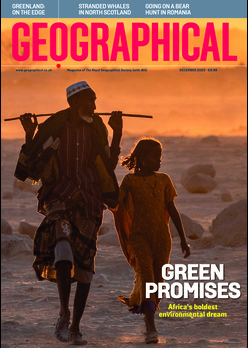
Governments and business leaders are failing our forests, according to the wildlife charity
By
‘Despite them being one of our strongest allies in the fight against climate change, the world is failing forests.’ So begins a new landmark report by the WWF, which assesses the state of forest conservation around the world.
The Forest Pathways Report found that the world is ‘off-track’ for a pledge made at COP26 by more than 140 countries – representing 90 per cent of the world’s forests – to end and reverse deforestation by 2030.
Instead, 2022 alone saw 6.6 million hectares of global forest razed from existence, with tropical forests losing 4.4 million hectares – a patch the size of Denmark.
Deforestation is largely driven by logging and land use changes for agriculture. Soy, palm oil, cocoa and coffee crops are the most common offenders, and were responsible for approximately 392 million tonnes of carbon dioxide emissions in 2021, according to the report.
That is despite the fact that it is widely accepted that protecting our forests will be crucial in limiting a global rise in temperatures to a manageable level and removing carbon dioxide from the atmosphere.
Related articles
Forests absorb a third of the world’s greenhouse gasses (GHGs), are home to 80 per cent of terrestrial biodiversity and provide livelihoods for over 1.6 billion people, noted the WWF. Species like gorillas, hornbills, orangutans and black-headed squirrel monkeys are highly dependent on their unique habitats in the tropical forest, and their populations are rapidly declining as a result of deforestation.
And the vanishing forests also pose an existential risk to humans.
‘There is no pathway to avoiding dangerous climate change unless we reverse the loss and degradation of forests,’ said the report ‘Climate, sustainable development and forest goals are dependent upon each other.’
Recent studies by the Amazon Network of Georeferenced Socio-Environmental Information (RAISG) have warned that crucial forests are rapidly approaching their tipping points – leading to irreversible change. The RAISG’s statistical analysis found that 20 per cent of Amazonian territory has suffered irreparable deforestation.
If too much forest is lost, tipping points can result in chain reactions that could destabilize the entire forest ecosystem, leading to further damage. As the forests degrade, they begin to release all of the stored carbon, exacerbating the conditions.

Tanya Steel, chief executive at WWF, said: ‘Every hectare of forest we lose takes us closer to runaway climate change, and despite all the promises our leaders have made to turn this around, there’s a huge chasm between where we are and where we should be.
‘Even worse, we’re continuing to finance deforestation through the products we buy and the activities governments and businesses support through the subsidies and investments they make.’
When government leaders signed the Glasgow Leader’s Declaration at COP26 in 2021, they agreed to increase funding for forest protection. Funding now lies at around $2.2 billion globally, according to the WWF, but this is dwarfed in comparison to the amount of money being spent on subsidies and investments into environmentally harmful products and practices – an estimated $378 billion to $1 trillion.
The WWF report is calling on governments to end the support for forest-harming industries in a clear blueprint that lays out the path to achieving the COP26 forest conservation goals.
‘We are at a major turning point with irreversible consequences,’ the report reads. ‘Climate change and the drivers of forest conversion and degradation are currently in charge of our forests’ future, but they do not have to be.’
The blueprint draws on a number of successful examples of forest conservation and restoration. For example, the Wild Ingleborough project in the Yorkshire Dales is currently undergoing a rewilding transformation, with 1,500 hectares of forest being restored. And the Khata Forest Conservation Area in Nepal has expanded by 1,900 hectares, becoming a crucial wildlife corridor for native tigers.
The plans propose a reformation of global trade rules, aiming to root out practices that harm forests throughout supply chains, and regulating the finance sector who are responsible for billions of pounds lending and investment to industries linked to deforestation.
It also suggests shifting towards nature-based economies and accelerating the recognition of land rights to indigenous peoples.
In the UK specifically, the WWF wants to see ‘due diligence’ systems already enshrined in the Environment Act 2021 actually acted upon and expanded. These would root out deforestation practices from supply chains and introduce environmental standards for all food sold and imported in the UK.
Mary Gagen, author of the Forest Pathways report and chief advisor for forests at WWF, said: ‘Our findings show the pathways to protected, restored and sustainably managed forests are known – we don’t need new forest targets, we need to implement the ones we have with high ambition and accountability.’




